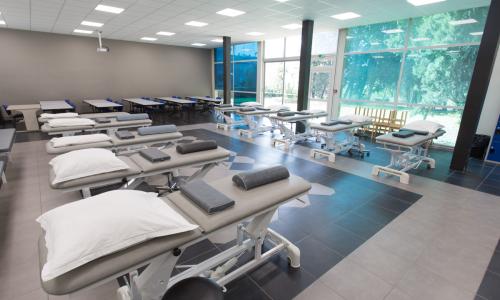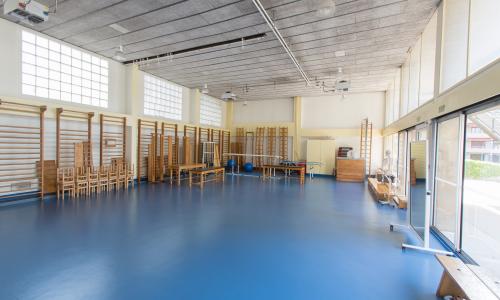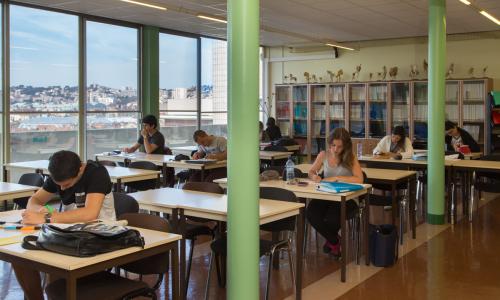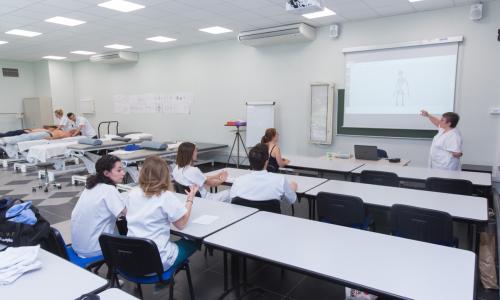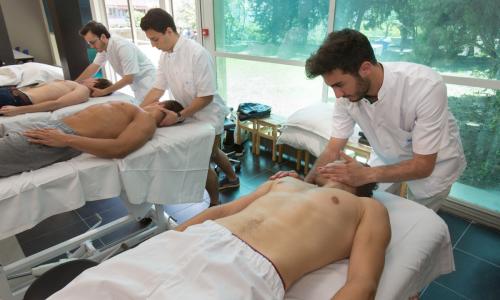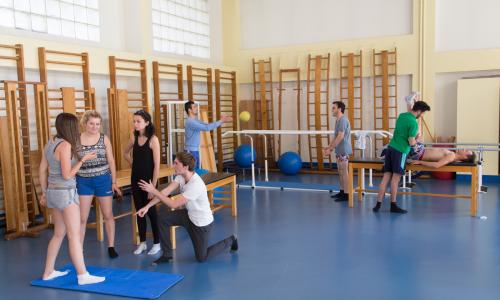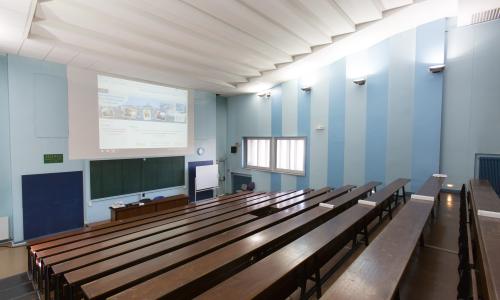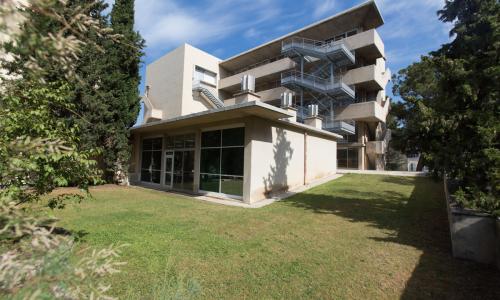The students receive practical and theoretical training in four years, which prepares them for the profession of masseur-physiotherapist.
The profession of masseur-physiotherapist
Masseur-physiotherapists are health professionals who intervene to educate, re-educate, prevent or treat movement or motor disorders, but also impairments or alterations of functional capacities (disability, locomotor, respiratory, cardiovascular, etc.).
It is a health discipline and a clinical science, which considers the patient as a whole (physical, mental and social health). Interventions allow :
- to elaborate a diagnosis, on medical prescription
- use manual techniques or sophisticated equipment.
Career opportunities
Masseur-physiotherapists practice in the public (20%) or private (80%) sector. They intervene in hospitals, clinics, sports centres, re-education centres, thermal establishments, EHPAD, etc.
Ils élaborent un diagnostic, sur prescription médicale, et utilisent des techniques manuelles ou un matériel sophistiqué.
Professionnels paramédicaux diplômés d'Etat, ils exercent dans le respect du code de santé publique, et du décret qui fixe la liste des actes autorisés. Leurs consultations sont prises en charge par la sécurité sociale.
Perspectives professionnelles
La profession s'exerce majoritairement en libéral (près de 90%). L'installation est libre sur l'ensemble du territoire, les débouchés varient selon les régions.
Il est également possible d'exercer en tant que salariés dans les hôpitaux, cliniques, centres sportifs, centres de rééducation, établissements thermaux, EHPAD, etc.
Profil des professionnels
Les masseurs-kinésithérapeutes ont des connaissances scientifiques et techniques solides, une bonne résistance physique et mentale, une capacité d'écoute et de communication, de la bienveillance, de l'empathie, un sens de l'éthique et de la responsabilité.
How to access?
There are two possible routes for admission to the training course:
- first year of access to health studies
- Partial dispensations of competition
See the conditions for admission to the course and the university registration procedure.
Training organization
The training that prepares for the State diploma of masseur-physiotherapist takes place in 4 years (8 semesters and 240 ECTS) after a validated academic year, equivalent to level 1 of the national directory of professional certifications (RNCP).
At the end of the 4th year, the diploma is awarded after validation:
- teaching units and internships
- of the graduation thesis
- of presenteeism in practical work and tutorials.
Calendrier universitaire
- SCIENCES de la READAPTATION - Calendrier universitaire 2024-2025
- Calendrier des dates de rentrée et prérentrée 2024-2025
Dates de rentrée universitaire 2024-2025 :
- Année 1 - K1 : 02 septembre 2024 à 14h00
- Année 2 - K2 : 30 août 2024 à 15h00
- Année 3 - K3 : 30 août 2024 à 10h00
- Année 4 - K4 : 02 septembre 2024 à 10h00
Teaching and internships
Theoretical teaching represents a total of 3960 hours, and clinical and situational teaching represents 2940 hours in the form of internships. Personal work is also estimated at 3220 hours.
The areas of training are as follows:
- fundamental lessons
- science and engineering in physiotherapy
- learning and deepening
- learning and professionalization
Students carry out internships leading to ECTS credits, within the framework of clinical teaching :
- year 1: 2-week and 4-week courses
- year 2: 5-week internships
- year 3: 5-week internships
- year 4: 12-week clinicat
In the second year, they participate in the health service, for initiation to the challenges of prevention in the health field.
Equipment
Students benefit from a gymnasium, 3 amphitheatres with 150 seats and 7 practice rooms.
Tuition costs
In case of admission to the course, the fees per year of study are :
- Student and campus life contribution (CVEC): €91
- tuition fees: 2500 €
- tuition for repeaters: 1100 €.
- university registration fees: 170 €.
Scholarships and financial aid
In case of admission to the course, students can apply for a scholarship from the South PACA Region "in the health and social work fields". Eligibility conditions must be met before the start of the course. If you are not eligible, other funders can intervene.
Note: occupational therapy students do not have access to CROUS grants.
Internship students receive per diems and mileage allowances to cover their clinical training costs (travel, accommodation, etc.).
Apprenticeship
2nd, 3rd and 4th year students can complete their training with an apprenticeship contract, 40 places are available in total.
Their tuition fees are covered by the regional centre for work-linked training in hospitalisation professions (CERFAH) PACA.
The students sign an apprenticeship contract with a local employer (APHM, CRF, etc.) and become an apprentice employee. The salary is :
- 2nd year: 41 to 53% of the minimum wage and tuition fees paid by the PACA Region for 605 hours of work.
- 3rd year: 49 to 61% of the minimum wage and tuition fees paid by the PACA Region for 605 hours of work.
- 4th year: 65 to 78% of the minimum wage and tuition fees paid by the PACA Region, for 500 hours of work.
In return, students are required to attend all practical and theoretical courses and internships. They undertake to remain employees in their structure for the number of years of apprenticeship (1, 2 or 3 years).
Contact
Service de la scolarité de l'Ecole des sciences de la réadaptation.
Student intranet
For more information access the student intranet.
